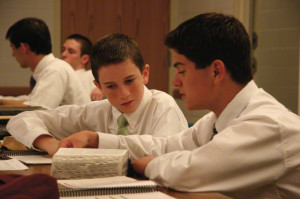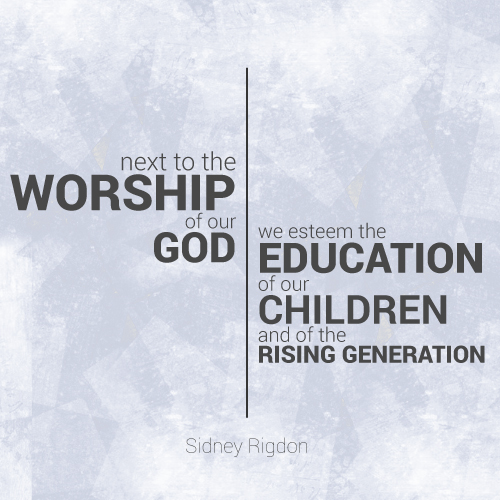My husband and I are in discussion. We’ve talked about it to our son.
I am watching in my son the death of love of learning. Death by paperwork. The sheer volume of “copy and paste” worksheets (find answer in book, insert in blank space) is exhausting him.
 I’ve watched him talk about remembering before a test that he needs to choose the correct answer, not the right answer-his version of explaining that he needs to answer what the teacher wants or what the book says, instead of what he really thinks is right.
I’ve watched him talk about remembering before a test that he needs to choose the correct answer, not the right answer-his version of explaining that he needs to answer what the teacher wants or what the book says, instead of what he really thinks is right.
I’ve watched him, exhausted, as he tries to understand what the teacher wants when they haven’t explained it well (or perhaps explained it better in another class), or it’s unnecessarily complicated. In some cases the work is not meaningful and he assumes it will be so he doesn’t understand it until he recognizes…..oh this is just stupid.
I’ve watched him attempt to cram his interest in a subject into a multiple choice test, and watch his innate love for that subject slowly die.
I’ve watched him try to do every single thing the teachers want.
I’ve watched him become exhausted because he sits all day long, passively listening as the teachers try desperately to cover everything they are supposed to cover to stay on schedule.
 I didn’t start this process not liking public school. I’ve never thought it’s the best way to educate–that will always be one-on-one with great books. But I thought public school is necessary and we need a literate, educated populace. We do need that. But is this really how we get there? Is the sheer volume of busy work supposed to be a fit substitute for thinking?
I didn’t start this process not liking public school. I’ve never thought it’s the best way to educate–that will always be one-on-one with great books. But I thought public school is necessary and we need a literate, educated populace. We do need that. But is this really how we get there? Is the sheer volume of busy work supposed to be a fit substitute for thinking?
In our homeschool we spend a lot of time reading great books and discussing them. Sometimes we do an activity or craft or go on a field trip related to the book. We do some math. I have found that this…is plenty! I have found that it meets the educational needs of my children. They flourish! The have time for their passions and in delving into them, their learning explodes! They are well prepared for college. They can write and read and do the math they need. They love learning and love reading. This works very well for us. This is what I have used to prepare my son for high school. Doing these basic things, he could slip seamlessly in with students who have spent hours and hours and hours and hours on homework. Why?
 Over and over I have found that what we want is an engaged student. It’s an educationese buzzword. Engage all of the students in learning. Use different learning styles, try different modes…although I agree that students have different learning styles and interests, I do not think we understand what an engaged learner looks like.
Over and over I have found that what we want is an engaged student. It’s an educationese buzzword. Engage all of the students in learning. Use different learning styles, try different modes…although I agree that students have different learning styles and interests, I do not think we understand what an engaged learner looks like.
I have found that the child, even the young child, running around the room, is still listening to the discussion. I have found the child making daisy chains at the edge of the group has great thoughts going on in their head related to what the “engaged” group is doing. Rarely do my children stare at me in rapt attention as I speak (which is what most educator administrators I’ve spoken with assume is engaged). Frequently they doodle, play with Legos or playdough, knit, or in other ways have busy hands. Their minds are engaged and I trust that, because I know from private conversation that even those children who never enter the discussion verbally have entered the discussion in their mind. They didn’t do a book report to prove it. They didn’t overanalyze the symbolism of the author’s every word. They are thinking about friendship, war, why people make the choices they do, how we decide to go to war, what peace really looks like, what love really looks like, what maturity is, how we can relate to people who are different than us, what leadership looks like…they have the ponder time to think those thoughts and they are encouraged by the discussion around them.
Do we really think such thoughts can be encouraged with a multiple choice test and copy and paste worksheets? When a child is having these thoughts, what does it mean when we tell them that what is really important is which of the four themes on the multiple choice test is most correct for this book? How do we teach and examine in bulk?
I know teachers want to teach children to think. I know this. I married a teacher who wants this. But how do you do that and grade them every 6 weeks? Most schools want something gradable almost every day of class. How do you allow for ponder time and provide enough homework to keep parents and administrators off your back? The pressure is real. My husband gave exceptionally minimal homework one year and the pressure from the parents and principal was intense. The children still learned. They were thinking. Most of their homework was to discuss with their parents and family some of what they were learning. They were writing. They did fabulously on the state test. It wasn’t enough. My husband lost his job.
Now with our son: he may stay in public school. That may be what he needs for…clearly not for learning…so perhaps some other reason. We will attempt to nurture his love of learning out of the classroom, and keep a small twig’s worth alive. Somehow. We will attempt to maintain his relationships with his siblings, though I am watching those change dramatically as well. Seeing the difference is difficult. And sad. He’s turning into a teenager who cares about friends and today and things…instead of the young man I once knew who cared about family and friends, the future, and ideas.
When I spoke with my son he said, “At least my education is going well.” He’s getting all A’s and 1 B he plans on bringing up to an A. That’s what he meant by education. When I ask what he’s learning, he talks about tests and quizzes. I asked about the book he’s reading,“To Kill a Mockingbird.” He talked about interrupting his reading to search for the vocabulary words the teacher identified.
He used to talk about ideas.
Britt grew up in a family of six brothers and one sister and gained a bonus sister later. She camped in the High Sierras, canoed down the Colorado, and played volleyball at Brigham Young University. She then served a mission to South Africa.
With all of her time in the gym and the mountains and South Africa, she was totally prepared to become the mother of 2 sons and soon to be 9 daughters. By totally prepared she means willing to love them and muddle through everything else in a partially sleepless state. She is mostly successful at figuring out how to keep the baby clothed, or at least diapered, though her current toddler is challenging this skill.
She feels children naturally love to learn and didn’t want to disrupt childhood curiosity with worksheets and school bells. She loves to play in the dirt, read books, go on adventures, watch her children discover new things, and mentor her children. Her oldest child is currently at a community college and her oldest son is going to high school at a public school. She loves to follow her children in their unique paths and interests.
She loves to write because, unlike the laundry and the dishes, writing stays done. Whenever someone asks her how she does it all she wonders what in the world they think she’s doing.








Before my children started kindergarten, they could read, add, subtract, and multiply. They learned at their own request and did it just for fun. The first day I homeschooled the two youngest, they brought me their math worksheet, a review because I suspected their math skills had suffered from an experimental program, and demanded their candy. I refused to give them candy. They went through a list of rewards teachers gave for work. When I refused them all, one said, “Then why are we doing this? Why do we need to learn if we aren’t getting anything?” My heart broke. The ability to learn for the pure joy of it was gone and learning was mere duty. It took me about a year to give them back their joy.
As a homeschooling mom with my eldest in High School at her own insistence, this is a topic that is near and dear to my heart. On the other hand, my husband is a High School Teacher and if the administrators want to be […], which happens pretty often, they give him evaluations that say the students are not engaged, one time when they were apparently all looking strait at him and then again recently when they were participating loudly, he was told that the students were in retreatism. How the […] did an administrator with about 3 years in the classroom come to that diagnosis!!!??? Its crazy making, and a good teacher who loves teaching is going to retire as soon as possible.
I unschool my three children. It was never my plan, but we had an extended period of illness in which we did nothing formal. We sat down to do a “lesson” on evolution only for my children (all under 6 at the time) to recite so much knowledge on the subject that I needed to get out college level books. Asked where it had came from “Trip to the museum, Phineas and Ferb, and Pokemon.” It forced me to reassess the way I home educated. That brought a lot of nail biting as my eldest took longer than I expected to read and write etc but my 11 year old daughter has a fantastic grasp of spelling, punctuation and grammar just from reading. When we go shopping she is the first to point out when a bill is wrong – her mental arthimetic is amazing. My 8 year old is grasping the ideas at the same rate as his sister and I am a lot less worried — now. Admittedly it would be nice if my boys would get geeky about something other than Minecraft but I am sure it will pass (previous obsessions have been birds, dinosaurs, fire, lions and the weather).
Terrie, how did your kids regain their love of learning — how did you encourage that?
Terrie, thanks for sharing. It is true that children can detox. They can relearn or unbury their love of Learning that is just so natural and beautiful. The bribe was probably to finish the worksheet…but they connect it with learning. sigh. They are blessed to have you as a mom to let their joy flourish again!
S–you asked how we regained the love of learning. I told them that there would not only be no prizes, but there wouldn’t even be grades. We wouldn’t need them because our goal was mastery, not speed. If they missed a problem or had to have a paper edited, we sat down together and went over it. Every paper would eventually be perfect. When they were finished and had practiced a bit, they decided when they had mastered it and we moved on. As Britt mentions, we did a lot of talking, reading, trying things out. We also focused more on ideas than memorization, as she did–although when you talk and read enough on a subject, you generally find you’ve also memorized what really matters. One day my daughter said, “I finished the chapter and passed the test, but I don’t feel like I mastered it. Can I do the chapter again?” At that point, I knew I’d won.
have a love/hate relationship with this idea. Yes, learning is fun, but I don’t think is reasonable to expect to be all fun. I love that we use literature. I don’t regret time spent discussing books and it’s a privilege to have the freedom to customize our education goals with their interests. I will continue doing just that. However, persisting through a difficult math concept, isn’t always fun. Learning to write an excellent essay, isn’t always fun. There is work involved, whether it’s academics, chores or character. Many children will take the path of least resistance. I did just that as a child and the apples don’t fall far from the tree. I have cried tears over the fact that my homeschool didn’t measure up to what I thought it needed to look like. Thankfully, I have a better understanding of how we operate and have stopped romanticizing the process.
Charlotte, have you seen all that people have done with minecraft to teach? http://venturebeat.com/2012/01/17/how-to-teach-history-and-lots-more-with-minecraft/
It is amazing as time goes how confident we grow in the amazing abilities of children to learn in such natural and gentle ways.
Terrie…great example of when you knew you’d won!
TW I absolutely agree there is work involved in learning. HARD work. meaningful work. Some of it is tedious. Some of it is repetitive. What motivates such amazing hard work? a love of learning, a passion for the subject and dedication.
Love of learning keeps you going through the hard, meaningful work of learning. It keeps you learning even when parts of what you want to learn aren’t as fun or aren’t in your wheel house.
My 14yo son is definitely old enough for the hard work side of learning. what’s killing him is the tedium of meaningless work. busy work.